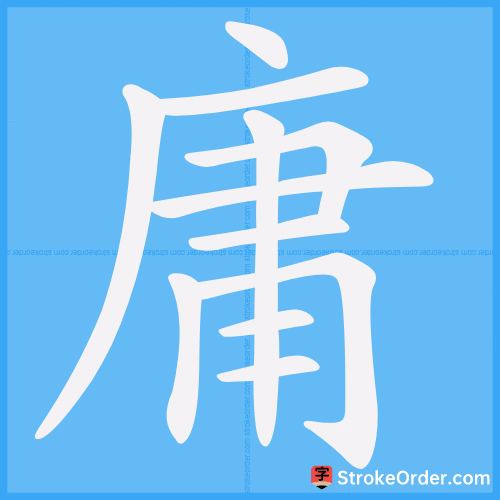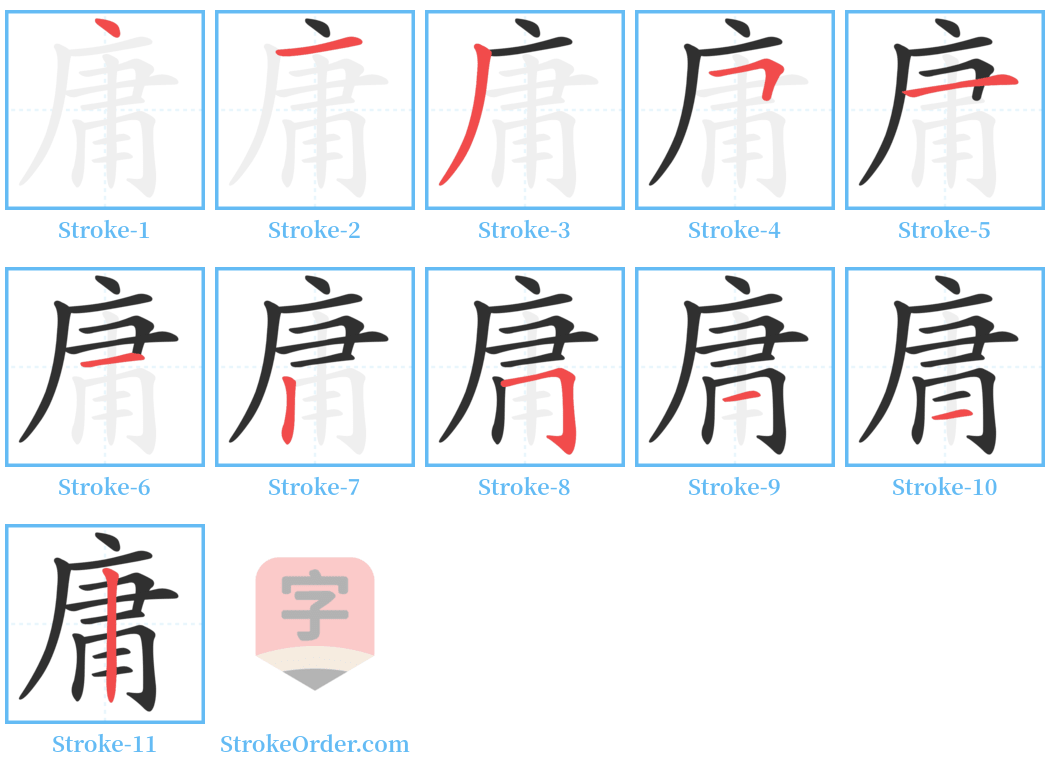庸 Stroke Order
Animated Stroke Order of 庸

Stroke Order Diagrams for 庸

Step-by-Step Handwriting Guide for 庸

Learn to Write Chinese Characters with Video Tutorials
Watch the video of writing the Chinese character "庸", learn the correct stroke order (笔顺) of the character "庸", and master the standard way of writing the character "庸".
Free Printable Handwriting Practice with Stroke Order: 庸
Printable Writing Practice Worksheet of "庸" in Portrait Orientation (Tian Zi Ge)

Printable Writing Practice Worksheet of "庸" in Landscape Orientation (Tian Zi Ge)

Information of 庸
Pinyin
yōng
Radical
广
Strokes
11 strokes
Usage
★★★★★
Definition
ordinary / to use
庸 [yōng]
**Meaning:**
1. Ordinary; not remarkable.
- 平常,不高明的:平庸。庸医(mediocre doctor)。庸言(commonplace words)。庸俗。庸人(ordinary person)。昏庸(mediocre and foolish)。庸主(mediocre or foolish monarch)。庸夫(mediocre husband)。庸暗(ordinary and ignorant)。庸庸碌碌(without ambition, accomplishing little)。
2. Need; necessary.
- 需要:无庸细述(no need to elaborate)。无庸讳言(no need to keep secret)。
3. How; in what way.
- 岂,怎么:庸讵(how, in what way, also written as “庸遽”)。
4. A type of tax system in the Tang Dynasty of China.
- 中国唐代一种赋税法:租庸调。
5. Merit; contribution.
- 功劳:庸绩(merit or achievement)。
6. Same as “佣”, meaning to employ or hire.
- 古同“佣”,雇佣。
**As a Verb:**
1. To need; to adopt.
- 同本义 ([En.] need; adopt).
2. Used primarily with negative adverbs such as “无”, “勿”, and “弗”.
3. To employ; to appoint.
- 任用 ([En.] employ).
4. To be hired; to sell one's labor.
- 受雇用,出卖劳动力 ([En.] be hired).
5. To reward for contributions.
- 酬其功劳 ([En.] reward).
**As an Adjective:**
1. Commonplace.
- 平常 ([En.] commonplace).
2. Mediocre.
- 平庸 ([En.] mediocre).
3. Vulgar.
- 庸俗,庸鄙 ([En.] vulgar).
4. Mediocre and foolish.
- 昏庸,庸下 ([En.] mediocre and stupid).
5. Meagre.
- 浅陋 ([En.] meagre).
**As a Noun:**
1. Merit.
- 功勋 ([En.] merit).
2. A hired person; laborer.
- 受雇用的人 ([En.] hired man).
3. Toil; effort.
- 劳苦 ([En.] toil).
4. Wages; salary.
- 受雇者的工钱 ([En.] wage).
5. An ancient state; now part of Hubei province.
- 古国名,在今湖北省 ([En.] Yong state).
6. A surname.
**As an Adverb:**
1. Perhaps; maybe.
- 或许,大概 ([En.] perhaps).
2. How; in what way. Indicates rhetorical questions.
- 怎么 ([En.] how). Indicates rhetoric.
3. Can imply rhetorical questions like “could it be said that…”
- 表示反问,可译为“难道”、“岂”、“哪里” ([En.] could it be said that…).
*(Note: Translated definitions are sourced from traditional dictionary interpretations.)*
Jin Yong, pen name of Louis Cha (1924-2018), wuxia 武俠|武侠[wu3 xia2] novelist, author of the 1957-1961 Condor Trilogy
Juyongguan, frontier fortress on Great Wall north of Beijing, in Changping district 昌平區|昌平区[Chang1 ping2 qu1]
(of an uneducated person) to mingle with the cognoscenti / to pose as a culture lover / to be a culture snob / having pretensions to culture
lit. silly people get their panties in a bunch (idiom) / fig. to get upset over nothing / to make problems for oneself
Input Method for 庸
Pinyin
yong1
Wubi
yveh|oveh
Cangjie
ilb
Zhengma
tgxl
Four Corner
00227
Unicode
U+5eb8
Same Pronunciation Characters